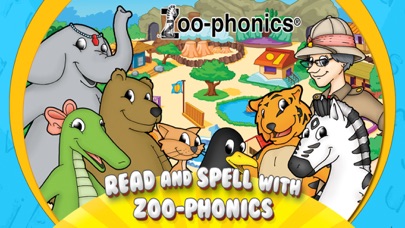
2. Zoo-phonics Animal Parade app for iPhone and iPad
Developer: Zoo-phonics, Inc.
First release : 24 Jul 2018
App size: 30.36 Mb
**GAME INTENDED FOR iPADS AND LARGE SCREEN PHONES**
Do you remember the song “Come Meet Us at the Zoo” from Zoophonia’s Address Book? Sing along with the music to help learn and memorize the Alliterative Names of the Animals, “a – z.”
Every time your children want to hear the song and see the Animals, they can click on the Flags with the Musical Notes. Remind children to Signal and sound as each Animal passes by! They can even guess who will appear next by looking at the Merged Animal Letters on the strip on the wall. If you are working together as a class on the SmartBoard, you can ask, “Who is coming next?” Children will begin to predict, which develops alphabetical order skills, and critical thinking skills.
Tell children that they can exit the Animal Parade by clicking on the Zoo Sign.
Lesson Objectives. The child will:
- meet the Animal Friends
- learn the song, “Come Meet Us at the Zoo”
- learn a-b-c order
- follow directions
- make decisions
- learn how to navigate and manipulate interactive elements on a screen, using eye-hand coordination
About Zoo-phonics
Teach your students the alphabet in TWO WEEKS! Faster than you ever expected your students will be reading, spelling and writing!
The Zoo-phonics Multisensory Language Arts Program is a kinesthetic, multi-modal approach to learning all aspects of language arts, including vocabulary development and articulation, based on phonics and phonemic awareness.
The principle of Zoo-phonics maximizes understanding, memory, utilization and transference to all areas of the reading, spelling and writing process in a playful and concrete manner.
Zoo-phonics is a method developed to make children strong readers and spellers using a “phono” (hearing), “oral” (speaking), “visual” (seeing), “kinesthetic” (moving), and tactile (touching)—whole brain approach. Students actually learn the sounds of the alphabet and advanced phonemic concepts through an easily understood, concrete method of presentation.
Zoo-phonics uses animals drawn in the shapes of the letters for ease in memory. A related body movement is given for each letter. This concrete approach cements the sounds to the shapes of the letters. Lowercase letters and their sounds are taught first (needed 95% of the time in text), capital letters and letter names are taught later.
Zoo-phonics also provides a springboard for all other academia such as math, art, music, cooking/nutrition, social studies, science, grooming, physical education and sensory/drama.
Every aspect of the program has been field-tested and found to be effective. Educational research repeatedly supports the focus of phonics in early reading programs, as well as the educational benefits of pictorial mnemonics and kinesthetic approaches to learning that are unique to Zoo-phonics.
Currently Zoo-phonics is used throughout the United States and internationally as a highly effective language arts program.



